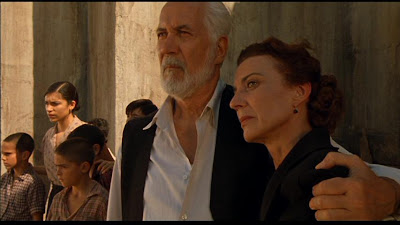(2001) Directed by Guillermo del Toro; Written by Guillermo
del Toro, Antonio Trashorras and David Muñoz; Starring: Marisa Paredes, Eduardo
Noriega, Fernando Tielve and Federico Luppi; Available on DVD
Rating: **** ½
“What is a ghost? A tragedy condemned to repeat itself time and
again? An instant of pain, perhaps. Something dead which still seems to be alive.
An emotion suspended in time. Like a
blurred photograph. Like an insect trapped in amber.” – Dr. Casares
An effective ghost story is more about what is unseen and
unheard, rather than the limited information that our senses can gather. With The
Devil’s Backbone, director/co-writer Guillermo del Toro spins a
paradoxically beautiful, horrible and affecting tale. Del Toro understands that feeling on a
visceral level is just as important as being shown unsettling imagery. The spiritual and tangible worlds establish
an uneasy co-existence, bridging a tenuous link between the living and the dead.
It’s the living, however, that we must
be wary of.
The film is set in the late 1930s, amidst the backdrop of
the Spanish Civil War. Del Toro would visit
a similar milieu, and continue his exploration of themes about the deleterious
effects of fascism, for his masterpiece Pan’s
Labyrinth (set several years after the conclusion of the civil war). The
title The Devil’s Backbone (aka: El Espinazo del Diablo) refers to a
specimen of Dr. Casares (Federico Luppi), a fetus in a jar with spina bifida
(referred to, in more superstitious, less enlightened times, as “the devil’s
backbone.”). Del Toro commented that
this also served as a metaphor for the residents of the film’s secluded
orphanage. They are “children of no
one,” shunned by the rest of society, and doomed to life on the fringe. A bomb, still ticking, in the orphanage
courtyard, serves as a grim reminder of the knife’s edge between life and death
that the children face.
We are introduced to the central character Carlos (Fernando
Tielve), as he’s abandoned by his tutor, and left at the orphanage. His relationship* with an older boy, Jaime (Íñigo
Garcés) is initially contentious, but an uneasy friendship is cultivated over
time. Although the orphanage’s
headmistress Carmen (Marisa Paredes) describes him as “meek,” he quickly proves
to be brave, generous and loyal. He
stands as a polar opposite to the film’s antagonist, Jacinto (Eduardo Noriega),
who possesses none of these traits.
* Guillermo del Toro infused
the film with autobiographical elements from his childhood, and his experiences
attending a boarding school in Mexico, based on the sometimes cutthroat
behavior between his classmates.
Described as a “prince without a kingdom,” the hateful
caretaker Jacinto (himself a product of the orphanage), lashes out at everyone
around him. Robbed of what he perceives his
birthright, he takes what he can and discards the rest. He’s primarily motivated by the prospect of
getting his hands on the gold that was hidden in the orphanage to help finance
the war effort. Jacinto responds to
everything with fear and hate. He fears
what he does not understand, such as connecting with another human being, and
his natural reaction is to respond with violence. In many respects, he’s the most pathetic
character in the film because of his limited range of interacting and reacting
with the world. He’s animalistic and
primal, motivated by self-preservation and incapable of empathizing with others. His
relationships are endemic of his disregard for everyone else. He maintains an empty sexual relationship
with the one-legged Carmen (in an effort to get closer to the gold), while keeping
a callous attitude toward his girlfriend, the selfless and gentle Conchita (Irene
Visedo). Although his behavior is
reprehensible, Jacinto never comes across as two-dimensional, but a lost soul,
as worthy of our pity as our scorn. His years
in the orphanage produced a bitter young adult with an impenetrable shell.
The other key player in The
Devil’s Backbone is Dr. Casares, who serves as a parental figure for
Carlos. He stays at Carmen’s side,
running the orphanage, while suppressing his unrequited love for her. Unable to express his love for her
physically, he endures her transgressions with Jacinto and bides his time. He is the island of calm and reason in a sea
of war and chaos. Casares is a man of
science, with no time for flights of fancy (or so it seems) or considering the
veracity of rumors of a ghost roaming the halls of the orphanage.
So what’s a ghost story without a ghost? The ghost takes on a decidedly supporting
role, since the interaction of the living characters is as integral to the
story. We’re aware of Santi’s (Junio Valverde)
presence from the very beginning, as he watches over the orphanage. He’s not there to frighten, but to provide a
warning to Carlos and the other children.
Spawned out of violence, he’s doomed to replay his tragic circumstances
for all time.
In the film’s engrossing, informative DVD commentary del
Toro remarked that, “…horror is exclusively about context.” Our minds fill in the blanks, occupying the
vacuum left by what we cannot comprehend. The
Devil’s Backbone generates an enduring feeling of dread and uneasiness
that’s not quickly ameliorated. In a
lesser horror film, a quick scare panders to an immediate reaction, but
vanishes quickly in the ether. The
scares in del Toro’s film are far more enduring. Witnessing the cruelties that humans inflict
on one another is one of the greatest horrors of all.
Guillermo del Toro has crafted a classic story of sadness,
despair, love, devotion and sacrifice, where each character is uniquely damaged
in his or her own way. The Devil’s Backbone is also one of the
finest ghost films, in good company with such supernatural tales as The Others and The Haunting.








No comments:
Post a Comment